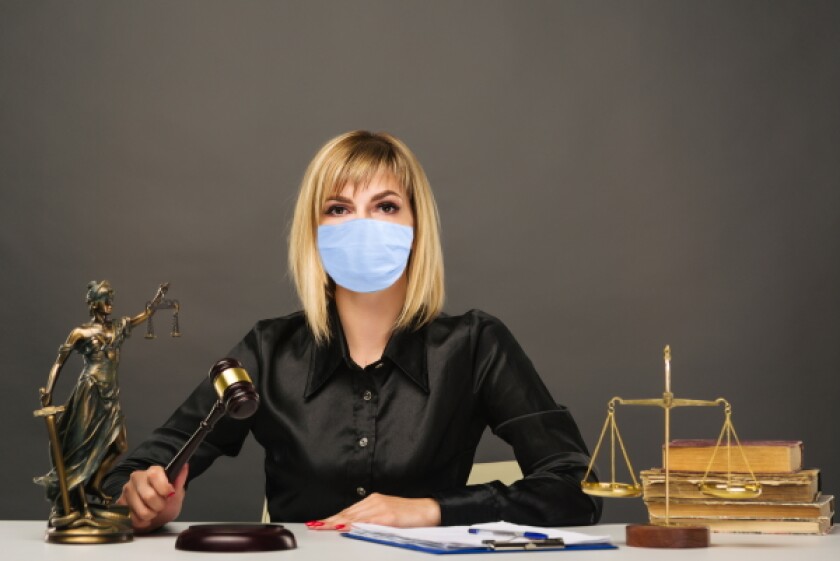The COVID pandemic has had a huge effect on intellectual property litigation this year, causing courts to shut down and hearings to be postponed, and forcing litigators and judges to experiment with virtual or socially-distanced proceedings and trials.
Speaking at the Managing IP Life Sciences Forum on Wednesday, September 23, counsel at Dechert, Fresenius Kabi and Bracco laid out the advantages and disadvantages of this type of litigation in Europe and the US that have become apparent over the past seven months.
Kassie Helm, partner at Dechert in New York City, kicked off the conversation with her experience of US proceedings. She said that the Court of Appeals for the Federal Circuit responded to the COVID crisis well, despite having to close in March and to shut down completely a few times during the Black Lives Matter protests in Washington DC.
Helm noted that the appellate court has been able to get through cases as efficiently, if not more efficiently, than before the pandemic, to the point where several judges have expressed an interest in continuing telephone-based arguments in a limited way after COVID.
She added that the district courts were hit a lot harder by the pandemic because of the challenges of conducting socially-distanced jury trials, but that they have now started such trials again in some places and were able to carry on with proceedings including markman hearings by virtual conference.
Helm said that beyond these challenges, one of the huge advantages of remote litigation is the opportunity to get junior lawyers more involved with cases.
“This is the perfect time to give junior associates more hands-on experience with remote proceedings and court appearances,” she said.
“This could help combat the anxiety that some might be feeling because of COVID, particularly those who think they’re not learning the skills they need or [getting] enough interaction with the partners. We can supplement their experience by giving them far more opportunities in virtual courtrooms.”
At the EPO
She noted that it was an interesting experience because the board was still trying to figure out how to do everything. “We weren’t allowed to go anywhere alone except for the toilet,” she said. “The whole setting was COVID ‘super safe’.”
The EPO, on the other hand, decided to conduct oral opposition proceedings by video conference until at least the end of this year. The problem with that situation, she said, is that if one party doesn’t want to attend these proceedings by virtual conference, the EPO will simply postpone them until 2021.
Sundermann noted that these refusals have been used to great effect, unfortunately, by patent owners that want to stall proceedings.
“Interestingly, it’s usually the patentees that don’t agree to have proceedings done by video conference,” she said. “This is strange because they should be interested in getting legal certainty to enforce their patents – so what is the problem here?
“I don’t understand why anyone declines video conferences at the EPO. And I do not understand why the EPO doesn’t force people to join by virtual conference.
“These decisions are important and they must not be postponed. In pharma, delays prevent a generic from entering the market, and the brunt of that is felt by the health systems. This is really a problem for the whole system and I’m not very happy about that.”
She added that it might not always come down to delay tactics, and that some patent attorneys don’t necessarily trust the EPO Opposition Division to listen closely enough to the arguments.
“But in my opinion, this is generally the old white-man attitude. They think people can only work in the office. But guess what, it is just as easy to not work in the office as it is from home.
“In fact, I have never seen an opposition division concentrate as hard as they did two weeks ago in a video conference. It is very possible to have a good video conference and to have a very bad physical oral proceeding.”
A UPC booster?
He noted that the biggest hurdle to the European harmonised patent project, which would enable counsel to file for and litigate patents that would cover almost all EU member states, was still German ratification.
But he added that the relevant policy makers might now be motivated to establish the UPC because of the very-much-needed cost-saving advantages of managing patents in one place at one time.
“My view is that COVID will favour the establishment of the system,” he said. “This system has a number of features that can help people cope with the COVID situation – it is intended to simplify processes and procedures.
“It is therefore a big booster for the chances of the UPC.”











